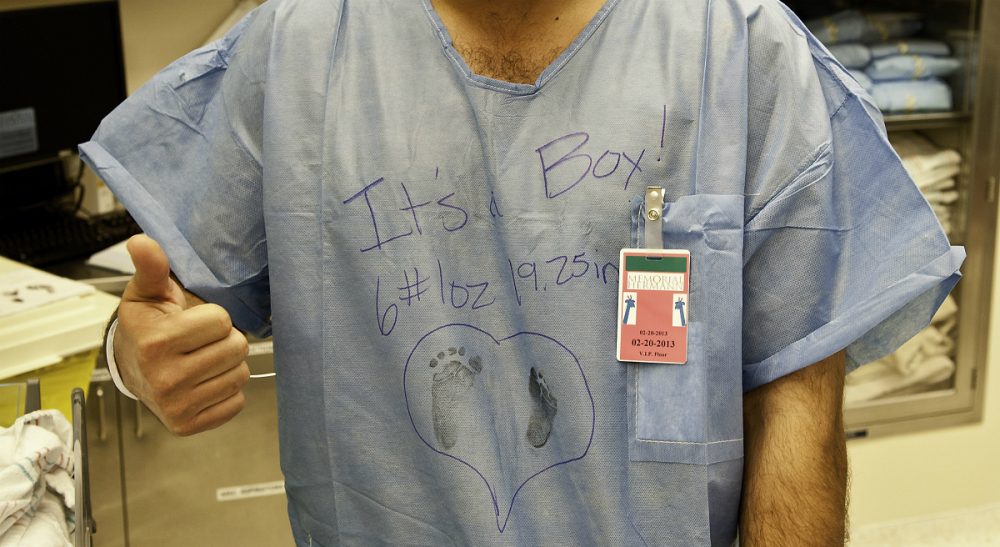Advertisement
Brave New World: Your Doctor, Your Private Parts, Twitter And You

My gynecologist just followed my vagina on Twitter. At least, that’s how it felt when I received email notification that I had a new Twitter follower.
To be fair, maybe it wasn’t my gynecologist who hit the “follow” button, but an employee at her practice. Does it matter? Because my ob/gyn’s name and Twitter handle are the same, and her Twitter avatar is her practice’s logo of a mother and child, entwined. Now she — or whoever her office’s social media manager is — knows my political views, sees the photos I take of my crafting projects and reads the recipes I plan to cook. It sounds innocuous, but it doesn’t feel so innocent.
I feel uncomfortable, because I don’t know how to navigate this new, social media dimension of our very professional, very contained-to-a-medical-setting relationship.
“That’s an invasion of privacy,” said my husband, puffed up with righteous indignation.
“Creepy,” wrote one friend on Facebook.
Another friend commented that her dentist follows her on Twitter. “I don’t get it,” she wrote.
What I find most confusing is my own reaction. It does feel unseemly, slightly freaky and certainly uninvited for the physician who helped bring my daughter into the world 13 months ago to know the Twitter version of myself.
But why?
After all, I know on a conscious, logical level that my tweets are public and can be seen by anyone. I mean, isn’t that the reason I use Twitter, to broadcast my ideas and opinions to a wider audience and to share the online content I find of interest? And if I already have a confidential, private relationship with a medical professional, who cares if she sees my very public tweets about the hottest Parisian beauty balms or chefs who have discontinued favorite dishes in New York restaurants?
The fact is that I do care. I feel uncomfortable, because I don’t know how to navigate this new, social media dimension of our very professional, very contained-to-a-medical-setting relationship. Is she going to re-tweet links I share? Is she going to respond with an “LOL” when I share mishaps about my day? Is she going to tweet reminders of upcoming appointments?
I doubt it. But still, I want to know the rules guiding her Twitter use, especially as they relate to her patients. But I don’t feel comfortable asking her directly. This is a can of social media worms that I’d rather not open with the woman who tells me where to plant my bum on the exam table and that the speculum might be cold. You’d think that if I felt comfortable talking to her about sex and babies and pap smears, I’d have no problem rocking a conversation about her Twitter use. But I resent being put in a position of even having to ask. The onus is on her to get it right.
So I contacted the American Medical Association, to see if it offers guidelines that address the patient-physician relationship on Twitter. It doesn’t. But the AMA’s code of ethics does have a general section on “Professionalism in the use of social media.”
There is, for instance, this advice: “If they interact with patients on the Internet, physicians must maintain appropriate boundaries of the patient-physician relationship in accordance with professional ethical guidelines, just as they would in any other context.”
Is she going to re-tweet links I share? Is she going to respond with an 'LOL' when I share mishaps about my day? Is she going to tweet reminders of upcoming appointments?
That appears to be the guiding principle of my friend Michael Katz, a cardiologist practicing in Rochester, N.Y. He is recognized as a top Twitter personality at American College of Cardiology conferences, and he’s very enthusiastic about physicians using Twitter — responsibly.
“I make a conscious effort not to follow patients that I am in a medical-care relationship with,” he wrote in an email. “While I would never intentionally violate patient privacy, Twitter is a public forum, and I would avoid even the perception of public discussion of private information.”
When asked what advice he’d offer his colleagues in the healthcare profession about Twitter use, he directed me to the social media policy of the Mayo Clinic: “Don’t Lie, Don’t Pry, Don’t Cheat, Can’t Delete, Don’t Steal, Don’t Reveal.”
That’s a good start. I’d like a little more specificity, though, so here’s my brief, free advice to medical professionals, especially those with social media profiles:
1. Post a sign in your reception area that states the social media policy for your medical practice. This will make sure your medical practice has a policy, and it will preemptively avoid awkward situations like mine.
2. Hire a social media professional if you have to, but identify the social media rules that fit with your mission. Yes, it’s the Wild West out there. But guidelines to rein in rogue Tweeting cowboys and Facebook-liking cowgirls exist.
As for my gynecologist, I still haven’t spoken with her directly about this Twitter conundrum. But I did follow her back.
Related:
